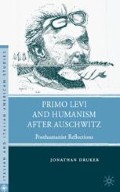Abstract
This book will meet with resistance. While I join the chorus of those who esteem Levi’s oeuvre as one of the most significant in the international literature of the Holocaust, I have argued here that the acute blindness of his humanism reveals nearly as much about the origins and meanings of Auschwitz as do his penetrating insights. His near inability to see the dangers within universality and instrumental reason, especially in his early texts, would not be important if this blindness were his alone. However, his humanism is also ours. This is especially evident, as I have argued in several chapters of this book, in the conventional ways he draws on the figure Ulysses and in his readers’ uncritical reception of these appropriations. In confirming Levi’s deep identification with Ulysses up to the end of his life, biographer Ian Thomson assumes, with good reason, that we secular Westerners also identify with the ancient traveler who fought to reach home and with the modern one, too, who returned from Auschwitz after great suffering. “Levi had said that he wanted as his epitaph the Greek words Homer used of his voyager Ulysses, ‘pollà plankte’. They mean ‘much erring’, or ‘driven to wander far and wide’; in his homesick exile, separated from his friends and home, the long-enduring Ulysses was a kind of Everyman. And so was Primo Levi, which is why he still feels so close to us in the twenty-first century.”1
Access this chapter
Tax calculation will be finalised at checkout
Purchases are for personal use only
Preview
Unable to display preview. Download preview PDF.
Notes
Ian Thomson, Primo Levi: A Life (New York: Metropolitan Books, 2002), 502. In a private communication to me, Robert Gurval suggested that polla planchthē is a better English transliteration of Homer’s ancient Greek than pollà plankte.
Homer , The Odyssey, trans. Robert Fitzgerald (New York: Vintage, 1990), 1.
Primo Levi, The Search for Roots, trans. Peter Forbes (Chicago: Ivan R. Dee, 2002), 22.
Cathy Caruth, Unclaimed Experience: Trauma, Narrative, and History (Baltimore: Johns Hopkins University Press, 1996), 62.
Cited in R. Clifton Spargo, Vigilant Memory: Emmanuel Levinas, the Holocaust, and the Unjust Death (Baltimore: Johns Hopkins University Press, 2006), 32, emphasis in original.
Max Horkheimer and Theodor W. Adorno, Dialectic of Enlightenment: Philosophical Fragments, ed. Gunzelin Schmid Noerr, trans. Edmund Jephcott (Stanford, CA: Stanford University Press, 2002), xvi, xviii, 165, emphasis added.
Primo Levi, “Afterword: The Author’s Answers to His Readers’ Questions,” trans. Ruth Feldman, in The Reawakening (New York: Macmillan, 1987), 217.
I mean especially the stories collected in Moments of Reprieve, trans. Ruth Feldman (New York: Summit Books, 1986); Primo Levi, If Not Now, When? trans. William Weaver, intro. Irving Howe (New York: Summit Books, 1985).
See Roberto Farneti, “Of Humans and Other Portentous Beings: On Primo Levi’s Storie naturali,” Critical Inquiry 32 (Summer 2006): 724–40;
Charlotte Ross, “Primo Levi’s Science Fiction,” in The Cambridge Companion to Primo Levi, ed. Robert S. C. Gordon (Cambridge: Cambridge University Press, 2007), 105–18.
Copyright information
© 2009 Jonathan Druker
About this chapter
Cite this chapter
Druker, J. (2009). Conclusion. In: Primo Levi and Humanism after Auschwitz. Italian and Italian American Studies. Palgrave Macmillan, New York. https://doi.org/10.1057/9780230622180_9
Download citation
DOI: https://doi.org/10.1057/9780230622180_9
Publisher Name: Palgrave Macmillan, New York
Print ISBN: 978-1-349-53989-5
Online ISBN: 978-0-230-62218-0
eBook Packages: Palgrave History CollectionHistory (R0)

